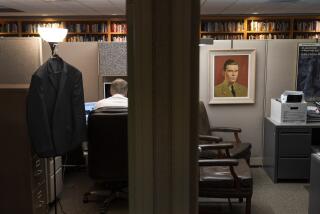Our unending fascination with secrecy
Fears of conspiracies and mysterious cabals are nothing new -- that’s what Arthur Goldwag illustrates in “Cults, Conspiracies and Secret Societies” (Vintage Books: $16 paper). The book is part compendium/part commentary on the numerous organizations and practices which strike fear in people’s hearts. Goldwag does more than cover territory popularized by Dan Brown -- though Opus Dei, the Templars, Illuminati and Freemasons are here. He also ranges far and wide to discuss the Hermetic Order of the Golden Dawn, for instance, alongside the Jesuits -- and, uh, Al Qaeda (?).
The key to these groups, he explains, is that they all depend, to some degree, on secrecy and initiation as a means of maintaining exclusivity -- and that is guaranteed to generate suspicion in non-members. Lest you shake your head dismissively at such groups, Goldwag offers many cautionary examples of how events shape and change our perceptions. In the case of the Sept. 11 terror attacks, for instance, he gives some good psychological insights into our collective behavior in its aftermath and the roles that various people took:
“If crises can produce a certain paranoid, pattern-seeking frame of mind akin to the cultic and conspiratorial worldview,” he writes, “they can also engender charismatic, omnicompetent leaders -- messianic father figures who take matters in hand and tell us what we need to think and do. New York City’s mayor Rudolph Giuliani turned out to be such a one.”
In a section titled “The Conspiratorial Frame of Mind,” Goldwag describes conspiracies in ancient Rome, the aura of mystery around the Freemasons, 9/11 theories, plots alleged to be the work of Jews (they’ve been blamed for just about everything, including the JFK assassination, the death of Princess Di and centuries of global unrest) and the appeal of places like Area 51 in the Nevada desert.
“Our susceptibility to conspiratorial thinking is literally hardwired in our brains,” Goldwag writes. He cites experiments at the University of Texas, Austin, and Northwestern University that explain why we’re so conspiratorially inclined: “[T]he less control people have over their lives, the more likely they are to try and regain control through mental gymnastics.”
*Want more like this? Read The Siren’s Call.
More to Read
Sign up for our Book Club newsletter
Get the latest news, events and more from the Los Angeles Times Book Club, and help us get L.A. reading and talking.
You may occasionally receive promotional content from the Los Angeles Times.






